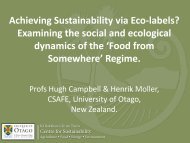Book of Abstract (incl. addendum) - IFSA symposium 2012
Book of Abstract (incl. addendum) - IFSA symposium 2012
Book of Abstract (incl. addendum) - IFSA symposium 2012
Create successful ePaper yourself
Turn your PDF publications into a flip-book with our unique Google optimized e-Paper software.
Workshop 6.1 Balancing and communicating overall assessments <strong>of</strong> food systems<br />
perspectives are based on certain value-laden problems, questions and concepts, indicators have builtin<br />
orientors, assessment systems are based on value-laden selections and reductions, stakeholders have<br />
different values and interests, organic agriculture has explicit ethical principles, and society has a range<br />
<strong>of</strong> objectives <strong>of</strong> relevance for food systems. The third challenge is how to communicate complex<br />
overall assessments in an effective and participatory way. This is needed by researchers and<br />
stakeholders in the development <strong>of</strong> assessment tools, by producers and other actors in the development<br />
<strong>of</strong> better organic practices, and by public authorities in the development <strong>of</strong> appropriate policies for<br />
organic food systems. Reduction <strong>of</strong> complexity, visualisation, and media all play a critical role in this.<br />
The role <strong>of</strong> values in multicriteria assessment methods<br />
Hugo F. Alrøe, Egon Noe and Martin H. Thorsøe<br />
Aarhus University, Denmark<br />
Hugo.Alroe@djf.au.dk<br />
In order to develop better and more sustainable food systems, there is a need to make overall<br />
assessments <strong>of</strong> their effects, and to bring those assessments into practice. One <strong>of</strong> the main challenges in<br />
this is the role <strong>of</strong> values. In organic food systems, in particular, values and ethics play a clear and<br />
important role. Furthermore, all multicriteria assessments are based on value-laden selections and<br />
weigtings <strong>of</strong> criteria, and the chosen indicators are connected with orientators that distinguish good<br />
changes from bad. It is therefore important to clarify how values and ethics enter into the assessment<br />
process, so that assessments and decisions can be made in a way that supports the development <strong>of</strong><br />
organic agriculture. This paper will analyse where and how values and ethics enter into different<br />
methods for multicriteria assessment and communication, identify the explicit and implicit built-in<br />
values in concrete multicriteria assessment tools, and compare them with the specific ethical principles,<br />
values and objectives that characterize organic production and consumption.<br />
A comparison <strong>of</strong> complex expert-based assessments versus quickscan<br />
assessments<br />
Fleur Marchand, Lies Debruyne and Ludwig Lauwers<br />
Institute for Agricultural and Fisheries Research<br />
Fleur.Marchand@ilvo.vlaanderen.be<br />
Past decades, several sustainability assessments emerged, ranging from very complex expert-based<br />
assessments to quick scan ones. The former type is based on expert information and an extensive data<br />
demand, the latter on information gathered instantly from the farmer. This research compare both types<br />
while using the following criteria: i) the design approach and characteristics; ii) the critical succes<br />
factors for implementation put forward by De Mey et al. (2011); iii) results in the field and evaluation<br />
by the end-users. As an example for an expert-based assessment, we used MOTIFS (Meul et al. 2008)<br />
designed for dairy farming in Flanders. We applied this tool on Flemish dairy farms within the EU-<br />
Interreg project DAIRYMAN. The OCIS Public Goods tool (Gerard et al. 2011), designed for organic<br />
dairy farms in Great Britain was used as example <strong>of</strong> a quickscan method. During the EU project<br />
SOLID, the tool was adjusted for the entire European region and applied on organic dairy farms. This<br />
research determines the strengths and weaknesses <strong>of</strong> both types <strong>of</strong> sustainability assessment systems<br />
<strong>incl</strong>uding the method <strong>of</strong> application, resulting in suggestions on which type <strong>of</strong> sustainability<br />
assessment is relevant depending on the case (related to the critical succes factors such as attitude <strong>of</strong><br />
model users, time and data availability, user friendliness, communication aid,…). Researchers and<br />
practitioners can use this information when developing or selecting, and possibly modifying, an<br />
appropriate tool for their goals.<br />
108











